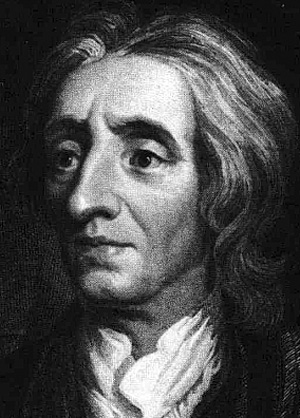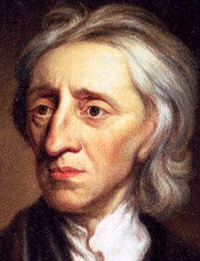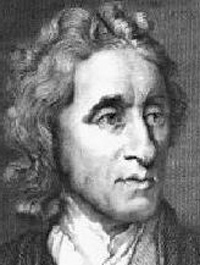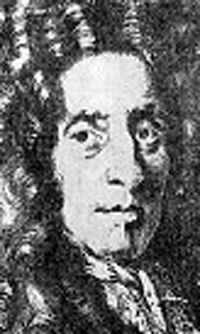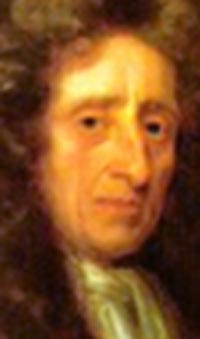John Locke
Astro-Rayological
Interpretation & Charts
Quotes
Biography
Images Physiognomic Interpretation
John Locke—English Materialistic Philosopher
September 8, 1632, NS, Somerset, England, time unknown. (Speculative: 6:15 AM, MDR) Died, October. 28, 1704, Oates, Essex, England.
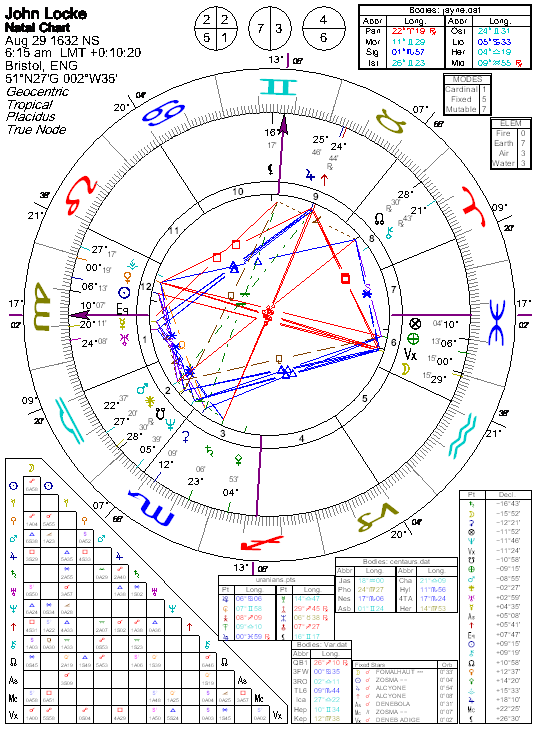
(Speculatively, Virgo may have been rising with the Sun in H12) (Sun in Virgo; Venus and Uranus also in Virgo; Mercury and Mars in Libra; Moon in Cancer; Jupiter in Taurus conjunct Pluto; Saturn and Neptune in Scorpio).The name of John Locke is associated with the concept of the “Tabula Rasa”—the “clean slate”—the idea that there is nothing in the mind which was not first in the senses. This approach clearly identifies him with the fifth ray rather than the third (as in the case of Immanuel Kant). For the fifth ray time, the senses are preeminent and apriori contents of mind are de-emphasized or considered non-existent. Uranus operates concretely in this instance as orthodox science.
The Sun and Mercury in Virgo reinforce the materialistic point of view, as would the Ascendant in Virgo—if Virgo were the Rising Sign. Jupiter in Taurus (emphasizing philosophy through its possible placement in H9—if Virgo rises) further strengthens the materialistic approach.
With a Virgo Rising chart, materialistic Saturn would be in the third house of concrete mind and perception. Virgo, as present in the chart of Locke, is to be read with respect to the first mantram—“Let Matter Reign”.
A sound mind in a sound body, is a short, but full description of a happy state in this World: he that has these two, has little more to wish for; and he that wants either of them, will be little the better for anything else.
All mankind... being all equal and independent, no one ought to harm another in his life, health, liberty or possessions.
All wealth is the product of labor.
An excellent man, like precious metal, is in every way invariable; A villain, like the beams of a balance, is always varying, upwards and downwards.
As people are walking all the time, in the same spot, a path appears.
Education begins the gentleman, but reading, good company and reflection must finish him.
Every man has a property in his own person. This nobody has a right to, but himself.
Fashion for the most part is nothing but the ostentation of riches.
Fortitude is the guard and support of the other virtues.
I attribute the little I know to my not having been ashamed to ask for information, and to my rule of conversing with all descriptions of men on those topics that form their own peculiar professions and pursuits.
I have always thought the actions of men the best interpreters of their thoughts.
I have spent more than half a lifetime trying to express the tragic moment.
If we will disbelieve everything, because we cannot certainly know all things, we shall do muchwhat as wisely as he who would not use his legs, but sit still and perish, because he had no wings to fly.
It is easier for a tutor to command than to teach.
It is of great use to the sailor to know the length of his line, though he cannot with it fathom all the depths of the ocean.
New opinions are always suspected, and usually opposed, without any other reason but because they are not already common.
No man's knowledge here can go beyond his experience.
One unerring mark of the love of truth is not entertaining any proposition with greater assurance than the proofs it is built upon will warrant.
Our deeds disguise us. People need endless time to try on their deeds, until each knows the proper deeds for him to do. But every day, every hour, rushes by. There is no time.
Our incomes are like our shoes; if too small, they gall and pinch us; but if too large, they cause us to stumble and to trip.
Parents wonder why the streams are bitter, when they themselves have poisoned the fountain.
Reading furnishes the mind only with materials of knowledge; it is thinking that makes what we read ours.
Reverie is when ideas float in our mind without reflection or regard of the understanding.
The discipline of desire is the background of character.
The improvement of understanding is for two ends: first, our own increase of knowledge; secondly, to enable us to deliver that knowledge to others.
The only fence against the world is a thorough knowledge of it.
The reason why men enter into society is the preservation of their property.
There cannot be greater rudeness than to interrupt another in the current of his discourse.
There is frequently more to be learned from the unexpected questions of a child than the discourses of men, who talk in a road, according to the notions they have borrowed and the prejudices of their education.
To love our neighbor as ourselves is such a truth for regulating human society, that by that alone one might determine all the cases in social morality.
To prejudge other men's notions before we have looked into them is not to show their darkness but to put out our own eyes.
We should have a great fewer disputes in the world if words were taken for what they are, the signs of our ideas only, and not for things themselves.
Where all is but dream, reasoning and arguments are of no use, truth and knowledge nothing.
Where there is no property there is no injustice.
The ignorance and darkness that is in us, no more hinders nor confines the knowledge that is in others, than the blindness of a mole is an argument against the quicksightedness of an eagle.
Government has no other end but the preservation of Property.
New opinions are always suspected, and usually opposed, without any other reason but because they are not already common
It is one thing to show a man that he is in an error, and another to put him in possession of the truth.
All men are liable to error; and most men are, in many points, by passion or interest, under temptation to it.
It will be no excuse to an idle and untoward servant, who would not attend his business by candle-light, to plead that he had not broad sun-shine. The candle, that is set up in us, shines bright enough for all our purposes.
The only fence against the world is a thorough knowledge of it.
If a child were kept in a place where he never saw any other but black and white till he were a man, he would have no more ideas of scarlet or green, than he that from his childhood never tasted an oyster, or a pineapple, has of those particular relishes.
He that has his chains knocked off, and the prison doors set open to him, is perfectly at liberty, because he may either go or stay, as he best likes; though his preference be determined to stay, by the darkness of the night, or illness of the weather, or want of other lodging. He ceases not to be free, though the desire of some convenience to be had there absolutely determines his preference, and makes him stay in his prison.
Any one reflecting upon the thought he has of the delight, which any present or absent thing is apt to produce in him, has the idea we call love.
If all political power be derived only from Adam, and be to descend only to his successive heirs, by the ordinance of God and divine institution, this is a right antecedent and paramount to all government; and therefore the positive laws of men cannot determine that, which is itself the foundation of all law and government, and is to receive its rule only from the law of God and nature.
He that will consider the infinite power, wisdom, and goodness of the Creator of all things, will find reason to think it was not all laid out upon so inconsiderable, mean, and impotent a creature as he will find man to be; who, in all probability, is one of the lowest of all intellectual beings.
Consciousness is the perception of what passes in a man’s own mind. Can another man perceive that I am conscious of any thing, when I perceive it not myself? No man’s knowledge here can go beyond his experience.
Knowledge being to be had only of visible and certain truth, error is not a fault of our knowledge, but a mistake of our judgment, giving assent to that which is not true.
Reason is natural revelation, whereby the eternal father of light, and fountain of all knowledge, communicates to mankind that portion of truth which he has laid within the reach of their natural facilities: Revelation is natural reason enlarged by a new set of discoveries communicated by God immediately, which reason vouches the truth of, by the testimony and proofs it gives, that they come from God.
Biography
John Locke
Birth: August 29, 1632 (Wrington, Somerset, England)
Death: October 28, 1704 (Essex, England)
School/tradition: British Empiricism, Social contract, Natural law
Main interests: Metaphysics, Epistemology, Political philosophy, philosophy of mind, Education
Notable ideas: tabula rasa, "government with the consent of the governed"; state of nature; rights of life, liberty and property
Influences: Plato, Aristotle, Aquinas, Grotius, Samuel Rutherford, Descartes, Hooker, Hobbes, Polish Brethren
Influenced: Hume, Kant, and many political philosophers after him, especially the American Founding Fathers, Arthur Schopenhauer (August 29, 1632 – October 28, 1704) was an influential English philosopher. In epistemology, Locke has often been classified as a British Empiricist, along with David Hume and George Berkeley. He is equally important as a social contract theorist, as he developed an alternative to the Hobbesian state of nature and argued a government could only be legitimate if it received the consent of the governed through a social contract and protected the natural rights of life, liberty, and estate. If such consent was not given, argued Locke, citizens had a right of rebellion.Locke's ideas had an enormous influence on the development of political philosophy, and he is widely regarded as one of the most influential Enlightenment thinkers and contributors to liberal theory. His writings influenced both Voltaire and, along with those of many Scottish Enlightenment thinkers, the American revolutionaries as reflected in the American Declaration of Independence.
Life
Locke's father, who was also named John Locke, was a country lawyer and clerk to the Justices of the Peace in Chew Magna,[1] who had served as a captain of cavalry for the Parliamentarian forces during the early part of the English Civil War. His mother, Agnes Keene, was a tanner's daughter and reputed to be very beautiful. Both parents were Puritans.Locke was born on August 29, 1632, in a small thatched cottage by the church in Wrington, Somerset, about twelve miles from Bristol. He was baptised the same day. Soon after Locke's birth, the family moved to the market town of Pensford, about seven miles south of Bristol, where Locke grew up in a rural Tudor house in Belluton.
In 1647, Locke was sent to the prestigious Westminster School in London under the sponsorship of Alexander Popham, a member of Parliament and former commander of the younger Locke's father. After completing his studies there, he was admitted to Christ Church college at Oxford University. The dean of the college at the time was John Owen, vice-chancellor of the university. Although a capable student, Locke was irritated by the undergraduate curriculum of the time. He found the works of modern philosophers, such as René Descartes, more interesting than the classical material taught at the university. Through his friend Richard Lower whom he knew from the Westminster School, Locke was introduced to medicine and the experimental philosophy being pursued at other universities and in the English Royal Society, of which he eventually became a member.
Locke was awarded a bachelor's degree in 1656 and a master's degree in 1658. He obtained a bachelor of medicine in 1674, having studied medicine extensively during his time at Oxford and worked with such noted scientists and thinkers as Robert Boyle, Thomas Willis, Robert Hooke and Richard Lower. In 1666, he met Anthony Ashley Cooper, 1st Earl of Shaftesbury, who had come to Oxford seeking treatment for a liver infection. Cooper was impressed with Locke and persuaded him to become part of his retinue.
Locke had been looking for a career and in 1667 moved into Shaftesbury's home at Exeter House in London, to serve as Lord Ashley's personal physician. In London, Locke resumed his medical studies under the tutelage of Thomas Sydenham. Sydenham had a major impact on Locke's natural philosophical thinking — an impact that would become evident in the An Essay Concerning Human Understanding.
Locke's medical knowledge was put to the test when Shaftesbury's liver infection became life-threatening. Locke coordinated the advice of several physicians and was probably instrumental in persuading Shaftesbury to undergo an operation (then life-threatening itself) to remove the cyst. Shaftesbury survived and prospered, crediting Locke with saving his life.
It was in Shaftesbury's household, during 1671, that the meeting took place, described in the Epistle to the reader of the Essay, which was the genesis of what would later become Essay. Two extant Drafts still survive from this period. It was also during this time that Locke served as Secretary of the Board of Trade and Plantations and Secretary to the Lords and Proprietors of the Carolinas, helping to shape his ideas on international trade and economics.
Shaftesbury, as a founder of the Whig movement, exerted great influence on Locke's political ideas. Locke became involved in politics when Shaftesbury became Lord Chancellor in 1672. Following Shaftesbury's fall from favour in 1675, Locke spent some time travelling across France. He returned to England in 1679 when Shaftesbury's political fortunes took a brief positive turn. Around this time, most likely at Shaftesbury's prompting, Locke composed the bulk of the Two Treatises on Government. Locke wrote the Treatises to defend the Glorious Revolution of 1688, but also to counter the absolutist political philosophy of Sir Robert Filmer and Thomas Hobbes. Though Locke was associated with the influential Whigs, his ideas about natural rights and government are today considered quite revolutionary for that period in English history.
However, Locke fled to the Netherlands in 1683, under strong suspicion of involvement in the Rye House Plot (though there is little evidence to suggest that he was directly involved in the scheme). In the Netherlands Locke had time to return to his writing, spending a great deal of time re-working the Essay and composing the Letter on Toleration. Locke did not return home until after the Glorious Revolution. Locke accompanied William of Orange's wife back to England in 1688. The bulk of Locke's publishing took place after his arrival back in England — his aformentioned Essay, the Two Treatises and A Letter Concerning Toleration all appearing in quick succession upon his return from exile.
Locke's close friend Lady Masham invited him to join her at the Mashams' country house in Essex. Although his time there was marked by variable health from asthma attacks, he nevertheless became an intellectual hero of the Whigs. During this period he discussed matters with such figures as John Dryden and Isaac Newton.
He died in 1704 after a prolonged decline in health, and is buried in the churchyard of the village of High Laver, east of Harlow in Essex, where he had lived in the household of Sir Francis Masham since 1691. Locke never married nor had children.
Events that happened during Locke's lifetime include the English Restoration, the Great Plague of London and the Great Fire of London. He did not quite see the Act of Union of 1707, though the thrones of England and Scotland were held by the same monarch throughout his lifetime. Constitutional monarchy and parliamentary democracy were in their infancy during Locke's time.
Influence
Locke exercised a profound influence on philosophy and politics, in particular on liberalism. He was a strong influence on Voltaire, while his arguments concerning liberty and the social contract later influenced the written works of Alexander Hamilton, James Madison, Thomas Jefferson, and other Founding Fathers of the United States. In addition, Locke's views influenced the American and French Revolutions.Appraisals of Locke have often been tied to appraisals of liberalism in general, and also to appraisals of the United States. Detractors note that he was a major investor in the English slave-trade through the Royal Africa Company, as well as through his participation in drafting the Fundamental Constitution of the Carolinas while Shaftesbury's secretary, which established a feudal aristocracy and gave a master absolute power over his slaves. Some see his statements on unenclosed property as having justified the displacement of the Native Americans. Because of his opposition to aristocracy and slavery in his major writings, he is accused of hypocrisy, or of caring only for the liberty of English capitalists. Most American liberal scholars reject these criticisms, however, questioning the extent of his impact upon the Fundamental Constitution and his detractors' interpretations of his work in general.
Theory of value and property
Locke uses the word property in both broad and narrow senses. In a broad sense, it covers a wide range of human interests and aspirations; more narrowly, it refers to material goods. He argues that property is a natural right and it is derived from labour.Locke believed that both ownership of property and value are created by the application of labour. Labour accounts for the large majority of the property value of an object. In addition, property precedes government and government cannot "dispose of the estates of the subjects arbitrarily." Karl Marx later adapted Locke's theory on property in his philosophies.
Political theory
Unlike Thomas Hobbes, Locke believed that human nature is characterised by reason and tolerance. Like Hobbes, Locke believed that human nature allowed men to be selfish and lustful. This is apparent with the introduction of currency. In a natural state all people were equal and independent, and none had a right to harm another’s “life, health, liberty, or possessions.” Locke never refers to Hobbes by name, however, and may instead have been responding to other writers of the day.[2] Locke also advocated governmental checks and balances and believed that revolution is not only a right but an obligation in some circumstances. These ideas would come to have profound influence on the Constitution of the United States and its Declaration of Independence.Limits to accumulation
Labour creates property, but it also contains limits to its accumulation: man’s capacity to produce and man’s capacity to consume. These limits are considered to prevent goods from being spoiled, or wasted. Goods of greater durability are introduced, those exposed to quick spoilage can be exchanged for something that lasts longer, for example: plums for nuts, nuts for a piece of metal. The introduction of money marks the culmination of this process. Money makes possible the unlimited accumulation of property without causing waste through spoilage. He also includes gold or silver as money because they may be “hoarded up without injury to anyone,” since they do not spoil or decay in the hands of the possessor. The introduction of money eliminates the limits of accumulation and inequality. Locke stresses that inequality has come about by tacit agreement on the use of money, not by the social contract establishing civil society or the law of land regulating property. Locke is aware of a problem posed by unlimited accumulation but does not consider it his task. He just implies that government would function to moderate the conflict between the unlimited accumulation of property and a more nearly equal distribution of wealth and does not say which principles that government should apply to solve this problem. However, not all elements of his thought form a consistent whole. For example, labour theory of value of the Two Treatises of Government stands side by side with the demand-and-supply theory developed in the Considerations. Moreover, Locke anchors property in labour but in the end upholds the unlimited accumulation of wealth.Locke on price theory
Locke’s general theory of value and price is a supply and demand theory. Supply is quantity and demand is rent. “The price of any commodity rises or falls by the proportion of the number of buyer and sellers.” and “that which regulates the price... [of goods] is nothing else but their quantity in proportion to their rent.” The quantity theory of money forms a special case of this general theory. His idea is based on “money answers all things” (Ecclesiastes) or “rent of money is always sufficient, or more than enough,” and “varies very little…” Regardless of whether the demand for money is unlimited or constant, Locke concludes that as far as money is concerned, the demand is exclusively regulated by its quantity. He also investigates the determinants of demand and supply. For supply, goods in general are considered valuable because they can be exchanged, consumed and they must be scarce. For demand, goods are in demand because they yield a flow of income. Locke develops an early theory of capitalization, such as land, which has value because “by its constant production of saleable commodities it brings in a certain yearly income.” Demand for money is almost the same as demand for goods or land; it depends on whether money is wanted as medium of exchange or as loanable funds. For medium of exchange “money is capable by exchange to procure us the necessaries or conveniences of life.” For loanable funds, “it comes to be of the same nature with land by yielding a certain yearly income … or interest.”John Locke (1632-1704)
"Though the familiar use of the Things about us, takes off our Wonder; yet it cures not our Ignorance."
---An Essay Concerning Human Understanding (III. vi. 9)"...he that will not give just occasion to think that all government in the world is the product only of force and violence, and that men live together by no other rules but that of beasts, where the strongest carries it...must of necessity find another rise of government, another original of political power..."
---from The Second Treatise of Civil Government
--------------------------------------------------------------------------------John Locke was an Oxford scholar, medical researcher and physician, political operative, economist and idealogue for a revolutionary movement, as well as being one of the great philosophers of the late seventeenth and early eighteenth century. His monumental Essay Concerning Human Understanding aims to determine the limits of human understanding. Earlier writers such as Chillingworth had argued that human understanding was limited, Locke tries to determine what those limits are. We can, he thinks, know with certainty that God exists. We can also know about morality with the same precision we know about mathematics, because we are the creators of moral and political ideas. In regard to natural substances we can know only the appearances and not the underlying realities which produce those appearances. Still, the atomic hypothesis with its attendant distinction between primary and secondary qualities is the most plausible available hypothesis.
Locke's Two Treatises of Civil Government were published after the Glorious Revolution of 1688 brought William of Orange and Mary to the throne, but they were written in the throes of the Whig revolutionary plots against Charles II in the early 1680s. In this work Locke gives us a theory of natural law and natural rights which he uses to distinguish between legitimate and illegitimate civil governments, and to argue for the legitimacy of revolt against tyrannical governments.Locke wrote on a variety of other topics Among the most important of these is toleration. Henry VIII had created a Church of England when he broke with Rome. This Church was the official religion of England. Catholics and dissenting Protestants, e.g Quakers, Unitarians and so forth, were subject to legal prosecution. During much of the Restoration period there was debate, negotiation and manuevering to include dissenting Protestants within the Church of England. In a "Letter Concerning Toleration" and several defenses of that letter Locke argues for a separation between church and state.
--------------------------------------------------------------------------------On Line Biographies
The Internet Encyclopedia of Philosophy
--------------------------------------------------------------------------------Locke Time Line
1632 29 August Locke is born.1642 The English Civil War begins
1646? Locke is admitted to Westminster School
1649 January 30. King Charles I is executed, the House of Lords abolished; England is declared a Commonwealth
1652 Locke goes to Christ Church College, Oxford. From this time until 1667 Oxford was Locke's usual place of residence.
1656 Locke graduates B.A.
1658 Locke graduates M.A.
1660 Locke meets Robert Boyle, the chemist, who was to be his friend and correspondent for thirty years. Locke writes his first treatise on the Civil Magistrate.
1660 Charles II returns to England and is restored to the throne.
1661 Locke's father dies.
1664 Locke is "Censor of Moral Philosophy" at Christ Church. He writes the Essays on the Law of Nature
1665 November-February 1666 Locke visits Cleves as part of a diplomatic mission accompanying Sir Henry Vane to the Elector of Brandenburg.
1665 Locke reads Descartes and finds in him the first viable alternative to Scholasticism he had encountered.
1666 Locke meets Anthony Ashley Cooper (later the first earl of Shaftsbury). Locke is granted a dispensation to keep his studentship without taking holy orders.
1667 Locke began collaborating with Thomas Sydenham in medical research.
1667 Locke joins Ashly's household in London as Lord Ashley's personal physician. From this time until 1675 Locke resided usually in London. He writes an Essay concerning Toleration
1668 Locke supervises an operation to remove a cyst from Lord Ashley's liver. Astonishingly, the operation is successful and the patient lives another 15 years! Locke is elected a Fellow of the Royal Society.
1670 Locke (under the supervision of Shaftsbury) writes the Fundamental Constitution of Carolina
1671 Locke writes the first draft of the Essay Concerning Human Understanding From this year until 1675 Locke appears to have been the secretary to the Lords Proprietors of Carolina
1671 Locke, along with Lord Shaftsbury and many others, buys shares in the Royal Africa Company - the company chartered by the crown to carry out the slave trade for Great Britain; he sells the shares at a profit in 1675
1672 October-November. Locke visits Paris
1675 Locke graduates M.B. On 12 November he goes to France and remains there until 1678
1678 Titus Oates charges that there was a Popish plot to kill King Charles II and put his Catholic brother James on the throne.
1679 Shaftsbury becomes Lord President of the King's Council. Locke returns to England. A bill to exclude the Catholic Duke of York from the Throne is passed by the House of Commons but fails in the House of Lords 15 October Parliament prorogued and Shaftsbury dismissed from office.
1681 Lord Shaftsbury tried for treason but acquitted.
1682 Locke meets Damaris Cudworth, daughter of Ralph Cudworth (a Cambridge Platonist).
1682 November 28. Shaftsbury flees to Holland where he dies on 21 January 1683
1683 September. The Rye House Plot to kill Charles II exposed; Locke flees to Holland; Essex, Russell and Algernon Sydney (leaders of the Whig party) arrested.
1684 Locke expelled from his studentship at Christ Church College, Oxford, by Royal command.
1685 Charles II dies; the Catholic Duke of York ascends the throne as James II.
1685 Lord Monmouth's (one of Charles II's illegitimate sons) rebellion. Monmouth invades England from Holland, Argyle raises a rebellion in Scotland. Both are suppressed.
1688 The Bibliotheque Universelle publishes a fifty page abstract of Locke's Essay Concerning Human Understanding
1688 William of Orange invades England and accomplishes the "Glorious Revolution of 1688." James II flees to France.
1689 February. Locke returns to England escorting the princess of Orange, who later became Queen Mary. He meets Sir Isaac Newton and they become friends.
1689 The Epistolia de Tolerentia was published, and translated by William Popple as A Letter Concerning Toleration.
1689 December. The Essay Concerning Human Understanding is published.
1690 The Two Treatises of Civil Government are published.
1690 Jonas Proast publishes The Argument of the 'Letter of Toleration' Briefly Considered and Answered
1691 Locke makes Oates, the residence of Sir Francis and Lady Masham, his permanent home.
1693 Some Thoughts Concerning Education published.
1694 The second edition of the Essay Concerning Human Understanding published.
1695 The Reasonableness of Christianity published anonymously.
1695 Locke answered criticisms of the Reasonableness in A Vindication of the Reasonableness of Christianity.
1696 A Board of Trade established and Locke appointed to it. The Board had a variety of duties including overseeing colonial governments. Though ill of health, Locke remained on the Board until 1700. He was its most influential member.
1697 A second Vindication of the Reasonableness of Christianity.
1697-99 Locke engaged in an extensive controversy with Edward Stillingfleet, Bishop of Worcester.
1700 Locke remained at Oates until his death in 1704.
